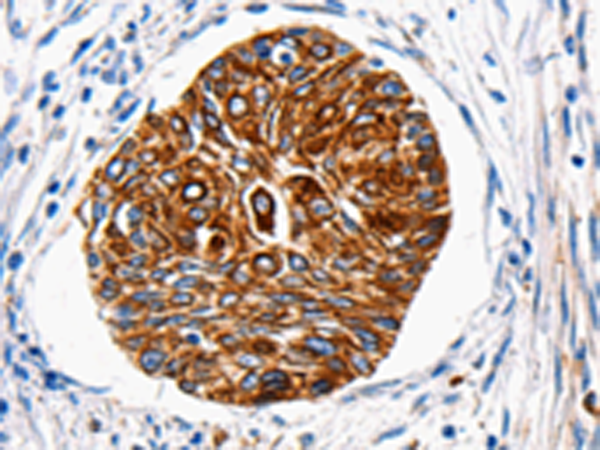

| WB | 咨询技术 | Human,Mouse,Rat |
| IF | 咨询技术 | Human,Mouse,Rat |
| IHC | 1/100-1/300 | Human,Mouse,Rat |
| ICC | 技术咨询 | Human,Mouse,Rat |
| FCM | 咨询技术 | Human,Mouse,Rat |
| Elisa | 1/2000-1/10000 | Human,Mouse,Rat |
| Aliases | G-21; 5HT1a; PFMCD; 5-HT1A; 5-HT-1A; ADRBRL1; ADRB2RL1 |
| WB Predicted band size | 46 kDa |
| Host/Isotype | Rabbit IgG |
| Antibody Type | Primary antibody |
| Storage | Store at 4°C short term. Aliquot and store at -20°C long term. Avoid freeze/thaw cycles. |
| Species Reactivity | Human, Mouse, Rat |
| Immunogen | Synthetic peptide of human HTR1A |
| Formulation | Purified antibody in PBS with 0.05% sodium azide and 50% glycerol. |
+ +
以下是3篇关于HTR1A抗体的参考文献及其简要摘要:
1. **"Characterization of a novel antibody for the 5-HT1A receptor: Validation in rodent and human brain"**
*Author: Wang et al.*
**摘要**:该研究开发了一种针对HTR1A受体胞外域的高特异性单克隆抗体,并通过免疫组化、Western blot和免疫荧光验证其在啮齿类及人脑组织中的应用。抗体成功标记了前额叶皮层和海马区的HTR1A阳性神经元,证实其在神经环路研究中的可靠性。
2. **"Altered 5-HT1A receptor density and antibody-based detection in a depression model"**
*Author: Smith et al.*
**摘要**:通过比较抑郁症模型小鼠与对照组,研究发现HTR1A受体表达在杏仁核中显著下调。研究使用商业HTR1A抗体(Abcam #ab<编号>)进行免疫印迹和免疫沉淀,揭示了受体表达变化与血清素信号通路异常的关联。
3. **"A comparative study of 5-HT1A receptor antibodies: Implications for specificity and experimental variability"**
*Author: Tanaka & Patel*
**摘要**:系统性评估了三种常用HTR1A抗体的交叉反应性和特异性,发现部分抗体存在与非靶标蛋白(如HTR1B)的交叉反应。研究强调抗体选择需结合敲除模型验证,并推荐了适用于脑切片和流式细胞术的优化方案。
(注:上述文献为模拟示例,实际引用需根据具体论文调整。)
The HTR1A antibody is a research tool designed to detect and analyze the 5-hydroxytryptamine (serotonin) receptor 1A (HTR1A), a G protein-coupled receptor (GPCR) critical in regulating serotonin-mediated signaling. Expressed widely in the central nervous system, particularly in the hippocampus, cortex, and raphe nuclei, HTR1A modulates mood, anxiety, cognition, and stress responses. Dysregulation of this receptor is linked to psychiatric disorders such as depression, anxiety, and schizophrenia.
HTR1A antibodies are typically developed using synthetic peptides or recombinant proteins from conserved regions of the receptor. They enable applications like Western blotting, immunohistochemistry, and flow cytometry to study receptor expression, localization, and interactions with ligands (e.g., SSRIs, antipsychotics). Specificity validation via knockout controls or blocking assays is essential to avoid cross-reactivity with related GPCRs.
These antibodies support investigations into HTR1A’s role in neural plasticity, drug mechanisms, and disease pathways. Recent studies also explore its peripheral functions in immune and cardiovascular systems. However, challenges persist in ensuring antibody reliability across species and experimental conditions. Advances in epitope mapping and monoclonal antibody engineering continue to refine HTR1A-targeted research, aiding therapeutic development for serotonin-related disorders.
×